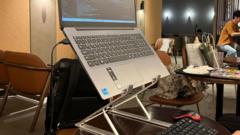---
In the upscale neighborhood of Daechi in Seoul, cafe owner Hyun Sung-joo faces the dilemma of accommodating the phenomenon known as "Cagongjok," referring to young South Koreans who occupy cafe spaces for extended study or work sessions. One recent incident involved a customer setting up an elaborate workstation that included two laptops and a six-port power strip, leaving him to block power outlets to manage the situation effectively.
Cafes in South Korea are popular study spots, often utilized more extensively than in many Western countries. Starbucks Korea has responded to this trend with new guidelines aimed at addressing the behavior of a minority of patrons who take over space with excessive setups, such as monitors and partitions, or leave their tables unattended. According to Starbucks, staff will provide guidance rather than evict customers outright—citing previous theft incidents and a commitment to creating a comfortable environment.
Despite the implementation of these policies, the moderate "Cagongjok" still thrive, appreciating cafes for their conducive atmosphere to study. An 18-year-old drop-out shared how she utilizes her local Starbucks, arriving at 11 AM and studying until 10 PM, sometimes temporarily abandoning her seat for meals. Although it remains unclear if the new guidelines are effectively curbing excessive occupation, many patrons welcome them as a necessary step towards restoring a balanced cafe experience.
Opinions about the new regulations vary. While some individuals—especially those hoping to use cafes for relaxation and conversation—support the guidelines, others criticize them as a departure from Starbucks' historically relaxed approach. The wider conversation surrounding "Cagongjok" reflects broader societal trends in South Korea, with an evident rise in coffee shop numbers over the last five years.
Independent cafes are also navigating this issue but with varied strategies. While specific extreme cases of space monopolization are rare, many cafe owners report a mix of considerate and inconsiderate behavior among patrons. For example, some cafes have introduced "No Study Zone" policies, while others are accommodating study habits with dedicated amenities.
The driving force behind the "Cagongjok" trend is compelling, as many young people prefer working in cafes over libraries or home. Yu-jin Mo, a 29-year-old who found solace in public cafes due to her difficult upbringing, illustrates the emotional and psychological comforts that cafes provide.
Professor Choi Ra-young from Ansan University attributes the rise of "Cagongjok" to South Korea's hyper-competitive environment, emphasizing that these young patrons are often under immense pressure from academics and job insecurity. To address this emerging culture, Professor Choi advocates for the creation of more inclusive spaces that respect the need for studying in public environments while also accommodating the preferences of other patrons.
In the upscale neighborhood of Daechi in Seoul, cafe owner Hyun Sung-joo faces the dilemma of accommodating the phenomenon known as "Cagongjok," referring to young South Koreans who occupy cafe spaces for extended study or work sessions. One recent incident involved a customer setting up an elaborate workstation that included two laptops and a six-port power strip, leaving him to block power outlets to manage the situation effectively.
Cafes in South Korea are popular study spots, often utilized more extensively than in many Western countries. Starbucks Korea has responded to this trend with new guidelines aimed at addressing the behavior of a minority of patrons who take over space with excessive setups, such as monitors and partitions, or leave their tables unattended. According to Starbucks, staff will provide guidance rather than evict customers outright—citing previous theft incidents and a commitment to creating a comfortable environment.
Despite the implementation of these policies, the moderate "Cagongjok" still thrive, appreciating cafes for their conducive atmosphere to study. An 18-year-old drop-out shared how she utilizes her local Starbucks, arriving at 11 AM and studying until 10 PM, sometimes temporarily abandoning her seat for meals. Although it remains unclear if the new guidelines are effectively curbing excessive occupation, many patrons welcome them as a necessary step towards restoring a balanced cafe experience.
Opinions about the new regulations vary. While some individuals—especially those hoping to use cafes for relaxation and conversation—support the guidelines, others criticize them as a departure from Starbucks' historically relaxed approach. The wider conversation surrounding "Cagongjok" reflects broader societal trends in South Korea, with an evident rise in coffee shop numbers over the last five years.
Independent cafes are also navigating this issue but with varied strategies. While specific extreme cases of space monopolization are rare, many cafe owners report a mix of considerate and inconsiderate behavior among patrons. For example, some cafes have introduced "No Study Zone" policies, while others are accommodating study habits with dedicated amenities.
The driving force behind the "Cagongjok" trend is compelling, as many young people prefer working in cafes over libraries or home. Yu-jin Mo, a 29-year-old who found solace in public cafes due to her difficult upbringing, illustrates the emotional and psychological comforts that cafes provide.
Professor Choi Ra-young from Ansan University attributes the rise of "Cagongjok" to South Korea's hyper-competitive environment, emphasizing that these young patrons are often under immense pressure from academics and job insecurity. To address this emerging culture, Professor Choi advocates for the creation of more inclusive spaces that respect the need for studying in public environments while also accommodating the preferences of other patrons.

















